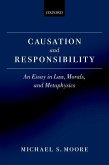Law at Work
Studies in Legal Ethnomethods
Herausgeber: Dupret, Baudouin; Berard, Tim; Lynch, Michael
Law at Work
Studies in Legal Ethnomethods
Herausgeber: Dupret, Baudouin; Berard, Tim; Lynch, Michael
- Gebundenes Buch
- Merkliste
- Auf die Merkliste
- Bewerten Bewerten
- Teilen
- Produkt teilen
- Produkterinnerung
- Produkterinnerung
This collection of empirical studies addresses many questions about the conduct of law in practice by treating law as a relationship between legal institutions and an external society.
Andere Kunden interessierten sich auch für
![Oxford Monographs in International Law Oxford Monographs in International Law]() Alexander OrakhelashviliOxford Monographs in International Law152,99 €
Alexander OrakhelashviliOxford Monographs in International Law152,99 €![The Hague Convention on International Child Abduction The Hague Convention on International Child Abduction]() Paul R BeaumontThe Hague Convention on International Child Abduction343,99 €
Paul R BeaumontThe Hague Convention on International Child Abduction343,99 €![The Law of Public Communication The Law of Public Communication]() William E LeeThe Law of Public Communication206,99 €
William E LeeThe Law of Public Communication206,99 €![Causation and Responsibility Causation and Responsibility]() Michael S MooreCausation and Responsibility233,99 €
Michael S MooreCausation and Responsibility233,99 €![Law Firm Strategy Law Firm Strategy]() Stephen MaysonLaw Firm Strategy175,99 €
Stephen MaysonLaw Firm Strategy175,99 €![The Legal System Between Order and Disorder The Legal System Between Order and Disorder]() Francois OstThe Legal System Between Order and Disorder169,99 €
Francois OstThe Legal System Between Order and Disorder169,99 €![Speaking of Language and Law Speaking of Language and Law]() Speaking of Language and Law156,99 €
Speaking of Language and Law156,99 €-
-
-
This collection of empirical studies addresses many questions about the conduct of law in practice by treating law as a relationship between legal institutions and an external society.
Hinweis: Dieser Artikel kann nur an eine deutsche Lieferadresse ausgeliefert werden.
Hinweis: Dieser Artikel kann nur an eine deutsche Lieferadresse ausgeliefert werden.
Produktdetails
- Produktdetails
- Verlag: Hurst & Co.
- Seitenzahl: 320
- Erscheinungstermin: 15. Juli 2015
- Englisch
- Abmessung: 234mm x 157mm x 25mm
- Gewicht: 612g
- ISBN-13: 9780190210243
- ISBN-10: 0190210249
- Artikelnr.: 47863999
- Herstellerkennzeichnung
- Produktsicherheitsverantwortliche/r
- Europaallee 1
- 36244 Bad Hersfeld
- gpsr@libri.de
- Verlag: Hurst & Co.
- Seitenzahl: 320
- Erscheinungstermin: 15. Juli 2015
- Englisch
- Abmessung: 234mm x 157mm x 25mm
- Gewicht: 612g
- ISBN-13: 9780190210243
- ISBN-10: 0190210249
- Artikelnr.: 47863999
- Herstellerkennzeichnung
- Produktsicherheitsverantwortliche/r
- Europaallee 1
- 36244 Bad Hersfeld
- gpsr@libri.de
Baudouin Dupret is Research Director at French National Centre for Scientific Research. Michael Lynch is a Professor of Science & Technology Studies at Cornell University. Tim Berard is an Associate Professor of Sociology at Kent State University.
* Introduction: Law at Work
* Baudouin Dupret, Michael Lynch, and Tim Berard
* Section I. Practical Action, Situated Interaction, and the Salience
of Law
* The Editors
* Chapter One: The Practical Grammar of Law and Its Relation to Time
* Baudouin Dupret and Jean-Noël Ferrie
* Chapter Two: Aspiring Magistrates: Entry Exams and General
Traineeship at the Court of Lecce
* Luisa Zappulli and Karen Latricia Hough
* Chapter Three: Practical Solutions: Praxiologial Analysis of
Judgments in Civil Hearings
* Pedtro Heitor Barros Geraldo
* Section II. Practical Pedagogies in the Performance of Legal
Activities
* The Editors
* Chapter Four: Hearing Clients' Talk as Lawyers' Work: The Case of
Public Legal Consultation Conference
* Shiro Kashimura
* Chapter Five: Producing Records of Testimony: Some Competent Legal
Methods for Incompetent Trials
* Kenneth Liberman
* Section III. Speech, Text, and Technology in Testimony
* The Editors
* Chapter Six: Reporting Talk When Testifying: Intertextuality,
Consistency and Transformation in Witnesses Use of Direct Reported
Speech
* Renata Galatolo
* Chapter Seven: Turning a Witness: The Textual and Interactional
Production of a Statement in Adversarial Testimony
* Michael Lynch
* Chapter Eight : "Is there someone in my videoconference room?"
Managing Remote Witnesses in Distributed Courtrooms
* Christian Licoppe and Laurence Dumoulin
* Section IV. Deviance, Membership Categories, and Legalities
* The Editors
* Chapter Nine: Hate Crimes, Labels, and Accounts: Pragmatic
Reflections on U.S. Hate Crimes
* Tim Berard
* Chapter Ten: Descriptions of Deviance: Making the Case for
Professional Help
* Stephen Hester and Sally Hester
* Chapter Eleven: Discursive Cartographies, Moral Practices:
International Law and the Gaza War
* Lena Jayyusi
* Baudouin Dupret, Michael Lynch, and Tim Berard
* Section I. Practical Action, Situated Interaction, and the Salience
of Law
* The Editors
* Chapter One: The Practical Grammar of Law and Its Relation to Time
* Baudouin Dupret and Jean-Noël Ferrie
* Chapter Two: Aspiring Magistrates: Entry Exams and General
Traineeship at the Court of Lecce
* Luisa Zappulli and Karen Latricia Hough
* Chapter Three: Practical Solutions: Praxiologial Analysis of
Judgments in Civil Hearings
* Pedtro Heitor Barros Geraldo
* Section II. Practical Pedagogies in the Performance of Legal
Activities
* The Editors
* Chapter Four: Hearing Clients' Talk as Lawyers' Work: The Case of
Public Legal Consultation Conference
* Shiro Kashimura
* Chapter Five: Producing Records of Testimony: Some Competent Legal
Methods for Incompetent Trials
* Kenneth Liberman
* Section III. Speech, Text, and Technology in Testimony
* The Editors
* Chapter Six: Reporting Talk When Testifying: Intertextuality,
Consistency and Transformation in Witnesses Use of Direct Reported
Speech
* Renata Galatolo
* Chapter Seven: Turning a Witness: The Textual and Interactional
Production of a Statement in Adversarial Testimony
* Michael Lynch
* Chapter Eight : "Is there someone in my videoconference room?"
Managing Remote Witnesses in Distributed Courtrooms
* Christian Licoppe and Laurence Dumoulin
* Section IV. Deviance, Membership Categories, and Legalities
* The Editors
* Chapter Nine: Hate Crimes, Labels, and Accounts: Pragmatic
Reflections on U.S. Hate Crimes
* Tim Berard
* Chapter Ten: Descriptions of Deviance: Making the Case for
Professional Help
* Stephen Hester and Sally Hester
* Chapter Eleven: Discursive Cartographies, Moral Practices:
International Law and the Gaza War
* Lena Jayyusi
* Introduction: Law at Work
* Baudouin Dupret, Michael Lynch, and Tim Berard
* Section I. Practical Action, Situated Interaction, and the Salience
of Law
* The Editors
* Chapter One: The Practical Grammar of Law and Its Relation to Time
* Baudouin Dupret and Jean-Noël Ferrie
* Chapter Two: Aspiring Magistrates: Entry Exams and General
Traineeship at the Court of Lecce
* Luisa Zappulli and Karen Latricia Hough
* Chapter Three: Practical Solutions: Praxiologial Analysis of
Judgments in Civil Hearings
* Pedtro Heitor Barros Geraldo
* Section II. Practical Pedagogies in the Performance of Legal
Activities
* The Editors
* Chapter Four: Hearing Clients' Talk as Lawyers' Work: The Case of
Public Legal Consultation Conference
* Shiro Kashimura
* Chapter Five: Producing Records of Testimony: Some Competent Legal
Methods for Incompetent Trials
* Kenneth Liberman
* Section III. Speech, Text, and Technology in Testimony
* The Editors
* Chapter Six: Reporting Talk When Testifying: Intertextuality,
Consistency and Transformation in Witnesses Use of Direct Reported
Speech
* Renata Galatolo
* Chapter Seven: Turning a Witness: The Textual and Interactional
Production of a Statement in Adversarial Testimony
* Michael Lynch
* Chapter Eight : "Is there someone in my videoconference room?"
Managing Remote Witnesses in Distributed Courtrooms
* Christian Licoppe and Laurence Dumoulin
* Section IV. Deviance, Membership Categories, and Legalities
* The Editors
* Chapter Nine: Hate Crimes, Labels, and Accounts: Pragmatic
Reflections on U.S. Hate Crimes
* Tim Berard
* Chapter Ten: Descriptions of Deviance: Making the Case for
Professional Help
* Stephen Hester and Sally Hester
* Chapter Eleven: Discursive Cartographies, Moral Practices:
International Law and the Gaza War
* Lena Jayyusi
* Baudouin Dupret, Michael Lynch, and Tim Berard
* Section I. Practical Action, Situated Interaction, and the Salience
of Law
* The Editors
* Chapter One: The Practical Grammar of Law and Its Relation to Time
* Baudouin Dupret and Jean-Noël Ferrie
* Chapter Two: Aspiring Magistrates: Entry Exams and General
Traineeship at the Court of Lecce
* Luisa Zappulli and Karen Latricia Hough
* Chapter Three: Practical Solutions: Praxiologial Analysis of
Judgments in Civil Hearings
* Pedtro Heitor Barros Geraldo
* Section II. Practical Pedagogies in the Performance of Legal
Activities
* The Editors
* Chapter Four: Hearing Clients' Talk as Lawyers' Work: The Case of
Public Legal Consultation Conference
* Shiro Kashimura
* Chapter Five: Producing Records of Testimony: Some Competent Legal
Methods for Incompetent Trials
* Kenneth Liberman
* Section III. Speech, Text, and Technology in Testimony
* The Editors
* Chapter Six: Reporting Talk When Testifying: Intertextuality,
Consistency and Transformation in Witnesses Use of Direct Reported
Speech
* Renata Galatolo
* Chapter Seven: Turning a Witness: The Textual and Interactional
Production of a Statement in Adversarial Testimony
* Michael Lynch
* Chapter Eight : "Is there someone in my videoconference room?"
Managing Remote Witnesses in Distributed Courtrooms
* Christian Licoppe and Laurence Dumoulin
* Section IV. Deviance, Membership Categories, and Legalities
* The Editors
* Chapter Nine: Hate Crimes, Labels, and Accounts: Pragmatic
Reflections on U.S. Hate Crimes
* Tim Berard
* Chapter Ten: Descriptions of Deviance: Making the Case for
Professional Help
* Stephen Hester and Sally Hester
* Chapter Eleven: Discursive Cartographies, Moral Practices:
International Law and the Gaza War
* Lena Jayyusi








